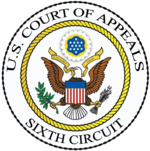| Connection Distributing Co. v. Holder | |
|---|---|
 | |
| Court | United States Court of Appeals for the Sixth Circuit |
| Full case name | Connection Distributing Co.; Rondee Kamins; Jane Doe; John Doe v. Eric H. Holder, Jr., Attorney General |
| Argued | September 10, 2008 |
| Decided | February 20, 2009 |
| Citations | Panel opinion: 505 F.3d 545 (October 23, 2007) En banc opinion: 557 F.3d 321 (February 20, 2009) |
| Case history | |
| Prior history | Summary judgment to the defendant, 95-01993 (N.D. Ohio) |
| Subsequent history | Appeal turned down by the U.S. Supreme Court without comment on October 5, 2009.[1] |
| Holding | |
| The court held that the record-keeping requirements of the Child Protection and Obscenity Enforcement Act did not violate the First Amendment. | |
| Court membership | |
| Judges sitting | Danny Julian Boggs, Cornelia Groefsema Kennedy, Boyce F. Martin, Jr., Alice M. Batchelder, Martha Craig Daughtrey, Karen Nelson Moore, R. Guy Cole, Jr., Eric L. Clay, Ronald Lee Gilman, Julia Smith Gibbons, John M. Rogers, Jeffrey Sutton, Deborah L. Cook, David McKeague, Richard Allen Griffin, Raymond Kethledge, and Helene White |
| Case opinions | |
| Majority | Sutton, joined by Boggs, Batchelder, Daughtrey, Gilman, Gibbons, Rogers, Cook, McKeague, Griffin, Kethledge |
| Dissent | Kennedy, joined by Martin, Moore, Cole, Clay, White |
| Dissent | Moore, joined by Martin, Cole |
| Dissent | Clay, joined by Martin, Cole |
| Dissent | White |
| Laws applied | |
| U.S. Const. amend. I; Child Protection and Obscenity Enforcement Act | |
Connection Distributing Co. v. Holder, 557 F.3d 321 (6th Cir. 2009)[2] is a case in which the United States Court of Appeals for the Sixth Circuit held that the record-keeping provisions of the Child Protection and Obscenity Enforcement Act did not violate the First Amendment.
Section 2257 of the Child Protection and Obscenity Enforcement Act requires those who create sexually explicit materials to maintain records of their model's age and identities, as a measure against child pornography. Connection Distributing, a publisher of swinging magazines, challenged the constitutionality of the statute, as individuals who posted on Connection's magazines would also be required to create and maintain such records, and provide them to the publisher.
In 2009, the Sixth Circuit ruled en banc that the provisions were not unconstitutional, while a panel of the court had decided in 2007 that the statute violated the First Amendment.
© MMXXIII Rich X Search. We shall prevail. All rights reserved. Rich X Search
